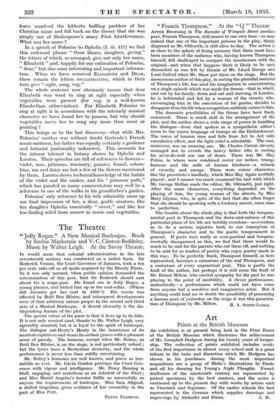" Francis Thompson." At the " Q " Theatre
AFTER Browning in The Barrens of Wimpole Street another poet, Francis Thompson, still nearer to our own time—so near indeed that one of the important persons in the play, thinly disguised as Mr. Oldcastle, is still alive to-day. The action is so close to the sphere of living memory that there must have been members of the audience who, having known Thompson himself, felt challenged to compare the simulacrum with the original—and when that happens there is likely to be such discomfort as was felt by friends of Mr. Lloyd George and Lord Oxford when Mr. Shaw put them on the stage. But the anonymous author of this play, in sorting the plentiful material of Thompson's life, has used his imagination in concentrating on a single episode which was made for. drama—that in which, cast out by his family, 'down and out and starving, in London, he is befriended and fed by a woman of the streets, who, encouraging him in the conviction of his genius, decides to disappear from his life When recognition suddenly comes to him. The dramatic possibilities of the theme have been finely conceived. There is much skill in the arrangement of the plot, and the author shows a wide range of power in handling the dialogue—from that spoken in a sympathetic editor's room to the coarse Junguage of tramps on the. Einbankment. The curve of tension rises and falls from Act to Act with cumulative effect, and the light relief is admirable. The cast, moreover, was an amazing one. Mr. Charles Carson cleverly Managed not to overdo the heavy father who is casting his ne'er-do-well son out of doors. There was Mr. Hay Petrie, in whom were combined coster (or rather, tramp) humour and the milk of human kindness—a miracle of vivacity and energy. There were minor characters like the prostitute's landlady, which Miss May Agate zestfully played ; and I cannot too much commend the tact with which Mr. George Sicilian made the editor, Mr. Oldcastle, just right. After the main characters, everything depended on the playing of Ann, the young woman of the streets, by Miss Mary Glynne, who, in spite of the fact that she often forgot that she should be speaking with a Cockney accent, came near to perfection.
The trouble about the whole play is that both the tempera- mental poet in Thompson and the down-and-outness of this particular phase of his life are terribly overdone—so overdone as to do a serious injustice both to our conception of Thompson's character and to the poetic temperament in general. If poets were really so over-poetical and tempera- mentally disorganized as this, we feel that there would be much to be said for the parents who cut them off, and nothing to be said for us readers of poetry who enjoy poetry made in this way. To be perfectly frank, Thompson himself, as here represented, becomes a caricature of the real Thompson, and a caricature of every unpractical poet. This is partly the fault of the author, but perhaps it is still more the fault of Mr. Ernest Milton, who carried sympathy for the part he was playing to the point of morbidity. A clever performance, undoubtedly—a performance which could not have come from anyone but a sensitive and imaginative actor. But if anything could lead me to doubt the possibility of presenting a famous poet of yesterday-on the stage it was this present* tion of Thompson by Mr. Milton. R. A. SCOTT-JAMES.






































 Previous page
Previous page